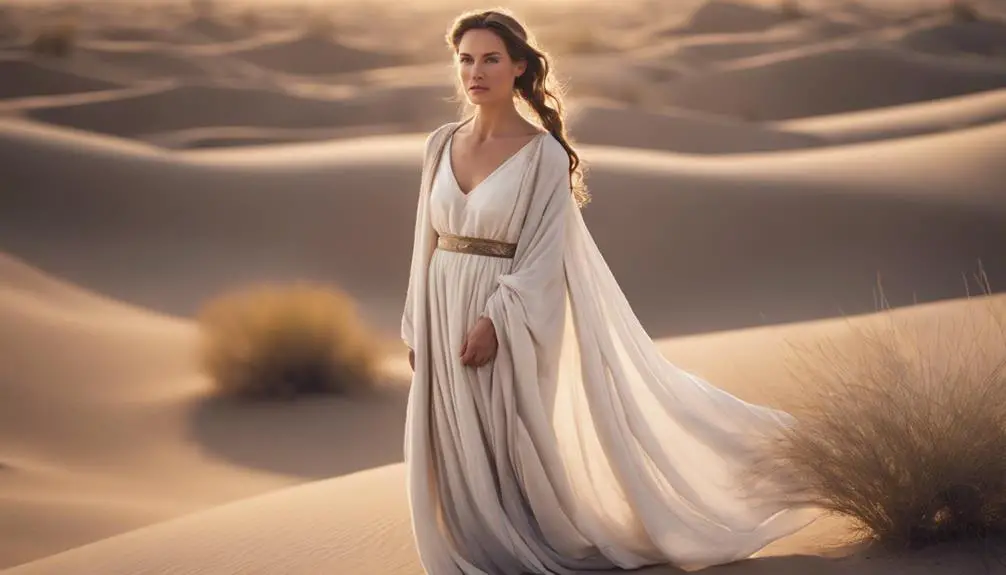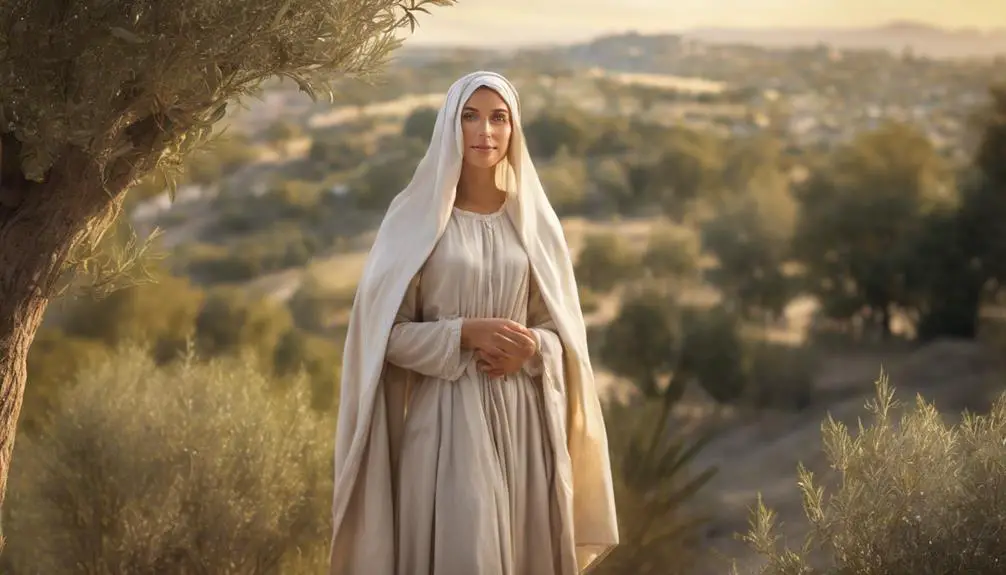Highlighting deeper facets of beauty, we delve into the lives of biblical women, reshaping your understanding of biblical femininity.

Most Beautiful Woman in the Bible
While beauty is often perceived as superficial, let's consider it in a deeper sense as we explore the most beautiful woman in the Bible.
You've likely heard tales of Sarah's elegance, Esther's courage, Abigail's wisdom, Bathsheba's allure, and Ruth's virtuous charm. Yet, does physical beauty alone define their worth?
Let's ponder this question together as we discuss who truly encompasses beauty in its fullest sense. This intriguing exploration might just alter your perspective on biblical femininity.
Key Takeaways
- Beauty in the Bible transcends physical attributes, manifested in virtues like wisdom, courage, loyalty, and faithfulness.
- Biblical figures like Sarah, Esther, Abigail, Bathsheba, and Ruth showcase different dimensions of beauty and influence.
- True beauty is an active force, not passive, used strategically for noble causes as seen in Esther's and Bathsheba's stories.
- The most beautiful women in the Bible are admired for their character and actions, not just their physical appearance.
Sarah's Timeless Elegance

Few biblical figures embody timeless elegance quite like Sarah, Abraham's wife, renowned for her captivating beauty and graceful demeanor. This ancestral elegance, coupled with her influential role, underscores her unique standing in biblical narratives.
You see, Sarah's Influence wasn't only superficial; it was deeply embedded in her character and actions, shaping narratives and outcomes in significant ways.
Despite being hailed for her beauty, Sarah's influence transcended her physical attributes. Her story exudes strength in adversity, faithfulness in uncertainty, and the grace to navigate complex interpersonal dynamics. These qualities, coupled with her role as the matriarch of the Abrahamic lineage, underscore the depth and breadth of her influence.
Ancestral elegance, as embodied by Sarah, is a fusion of physical beauty, strength, and grace under pressure. It's a timeless concept, transcending cultures and generations.
You'll find that Sarah's elegance wasn't just about her physical appearance; it was about her character, her resilience, her faith.
Esther's Courageous Beauty

Transitioning from Sarah, we encounter Esther, a woman whose beauty wasn't just skin deep but intertwined with her remarkable courage. Esther's Royal Influence in Persia was a testament to this amalgamation of physical attractiveness and bravery. She was chosen by King Xerxes above all others, not merely due to her compliance with the Persian Beauty Standards of the time, but for her distinct courage and resolve.
Esther's beauty, therefore, was a complex blend of physical charm, innate intelligence, and unyielding bravery. She used her influence to save her Jewish people from a mass genocide, even though it meant risking her own life. This wasn't a mere act of self-sacrifice; it was a strategic move that required patience, wisdom, and a profound understanding of the royal court's politics.
Her beauty, thus, wasn't a passive trait but an active force, a tool she wielded with grace and strength. The Persians admired her for her looks, but history remembers her for her courage. Esther's beauty was ultimately shaped by her bravery, making her a standout figure among the beautiful women in the Bible.
Abigail's Wise Attractiveness

Moving forward in biblical history, we encounter Abigail, a woman whose attractiveness was deeply rooted in her wisdom and discernment. Abigail's story, found in 1 Samuel 25, reveals a woman of remarkable mental acuity and diplomatic skill. Her husband Nabal's foolishness and arrogance nearly lead to disaster, but Abigail's diplomacy saves the day.
Abigail's attractiveness emanates not from physical beauty, but from her wisdom. She perceives the danger her household is in and acts decisively to avert it. She prepares a generous gift and rides out to meet the offended David, pleading for mercy with eloquence and humility. Her actions demonstrate a keen understanding of the situation and its potential outcomes.
Wisdom's attractiveness is vividly portrayed in Abigail's character. She's esteemed not for her physical appearance, but for her intelligence, courage, and tact. She embodies the proverb: 'Charm is deceptive, and beauty is fleeting; but a woman who fears the LORD is to be praised' (Proverbs 31:30). Her wisdom, a deep reverence for God, is what truly makes Abigail stand out. In today's society, where physical beauty is celebrated, Abigail reminds you that true attractiveness lies in wisdom and character.
Bathsheba's Captivating Allure
While Abigail's appeal lay in her wisdom, Bathsheba's allure is often associated with her stunning physical beauty. Her appearance was so captivating that it not only caught King David's eye, but also led him into temptation, a testament to Bathsheba's influence.
Historical texts describe Bathsheba as extraordinarily beautiful, an enchantress who unknowingly lured David away from his righteous path. As you delve deeper into Bathsheba's narrative, it's clear her beauty wasn't her only asset. She was also a woman of considerable tact and diplomacy, deftly navigating the complexities of the royal court.
Interestingly, Bathsheba's influence extended beyond David's temptation. She played a significant role in securing her son Solomon's succession to the throne, displaying a strategic acumen worthy of note. Bathsheba's allure, therefore, comprised both her physical beauty and her mental prowess, making her an intriguing figure in biblical history.
However, it's essential to remember that Bathsheba's story isn't just about David's temptation or her physical allure. It's also about a woman who, despite being caught in a web of power and intrigue, managed to influence her destiny and that of her son, Solomon. Bathsheba's captivating allure, thus, is multifaceted and complex, much like the woman herself.
Ruth's Virtuous Charm

Diving into Ruth's narrative, you discover a charm that goes beyond physical beauty, rooted deeply in her virtuous character and unwavering loyalty. Her story, rich with themes of selflessness and marital loyalty, offers an enlightening study of character beauty rather than physical attractiveness alone.
Ruth's selflessness is unmistakable. After her husband's death, she could have returned to her family and pursued a comfortable life. Yet, she chose to stay with her mother-in-law, Naomi, offering her unwavering support even in direst circumstances. This profound act of selflessness paints a vivid picture of Ruth's inner charm, a beauty that's more substantial than any physical attribute.
Equally remarkable is Ruth's marital loyalty. Despite her husband's death, she maintained her commitment to her in-laws, demonstrating a loyalty that extended beyond her marital vows. This loyalty, often overlooked in modern interpretations, represents a key aspect of Ruth's charm.
Frequently Asked Questions
Are There Any Other Women in the Bible Who Are Renowned for Their Beauty but Not Mentioned in These Sections?
Yes, there are other women in the Bible who are renowned for their beauty but aren't mentioned in these sections. This is due to certain Biblical beauty misconceptions.
For example, Sarah and Rebekah, wives of Abraham and Isaac, respectively, were noted for their beauty. However, they're often overlooked in discussions around unmentioned biblical beauties.
It's crucial to delve deeper into the text to uncover these less-highlighted figures.
How Did the Beauty of These Women Influence Their Roles and Stories in the Bible?
You're inquiring about how beauty influenced the roles and narratives of biblical women. Their beauty perception often impacted their destiny and divine femininity was highlighted. It's not just physical attractiveness; their inner beauty, strength, and wisdom often played a significant role too.
These women's beauty often made them influential, but it was their faith and virtue that truly defined their stories. Beauty was a factor, but their true legacy lies deeper.
What Are the Cultural and Historical Contexts Behind the Beauty Standards Displayed in the Bible?
When examining the cultural and historical contexts behind beauty standards in the Bible, you'll find diverse interpretations.
Biblical beauty standards weren't only about physical appearance. They also highly valued virtue and character.
Cultural interpretations varied greatly, influenced by societal norms and values of the period.
Are There Specific Bible Verses That Explicitly Describe the Physical Appearances of These Women?
Yes, there are specific verses that describe women's physical appearances. You'll find that beauty perception, along with expressions of biblical femininity, are woven throughout these descriptions.
For example, Sarah, Rebecca, Rachel, and Esther were all praised for their beauty. However, it's important to remember that these descriptions are often intertwined with the cultural and historical contexts of the time.
They're not just about physical beauty, but also about character and virtue.
How Did These Women Use Their Beauty for the Greater Good, Beyond Their Personal Stories Mentioned in This Article?
You're asking how women used their beauty for the greater good, beyond their personal narratives.
Beauty's impact on leadership is evident in how their attractiveness garnered influence. They leveraged this to effect positive change.
The spiritual significance of beauty isn't merely aesthetic; it's their inner grace that truly shone, inspiring others towards virtue and righteousness.
Their beauty, then, served a communal, transcendent purpose, and not just a personal one.
Conclusion
In your journey through the Bible, you've seen the remarkable beauty of Sarah, Esther, Abigail, Bathsheba, and Ruth. Each embodies unique qualities, adding depth to their beauty.
Sarah's elegance, Esther's bravery, Abigail's wisdom, Bathsheba's allure, and Ruth's virtue all contribute to their timeless beauty.
Their stories remind you that physical attractiveness is fleeting, while inner beauty, reflected in character and actions, truly defines the most beautiful woman in the Bible.



Sign up